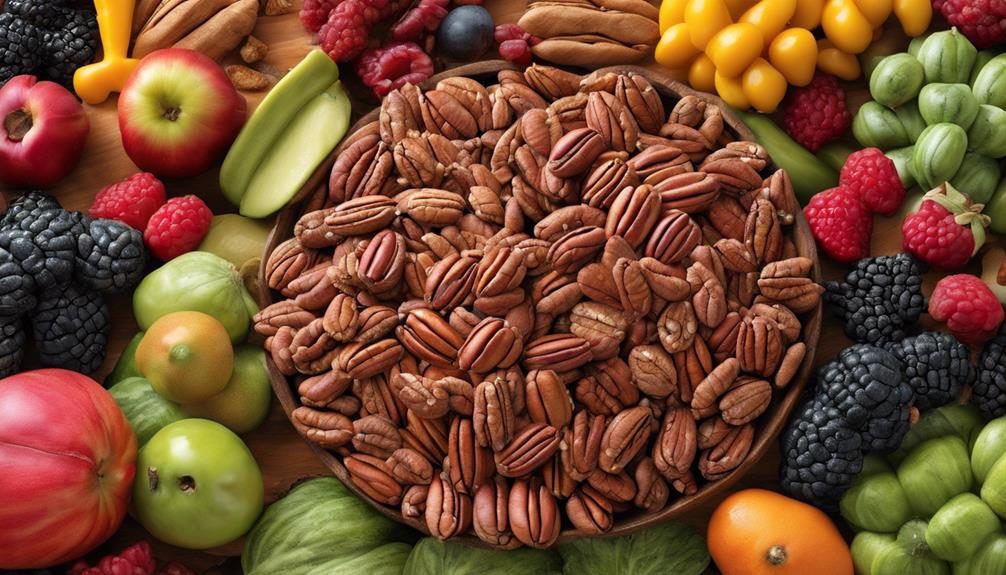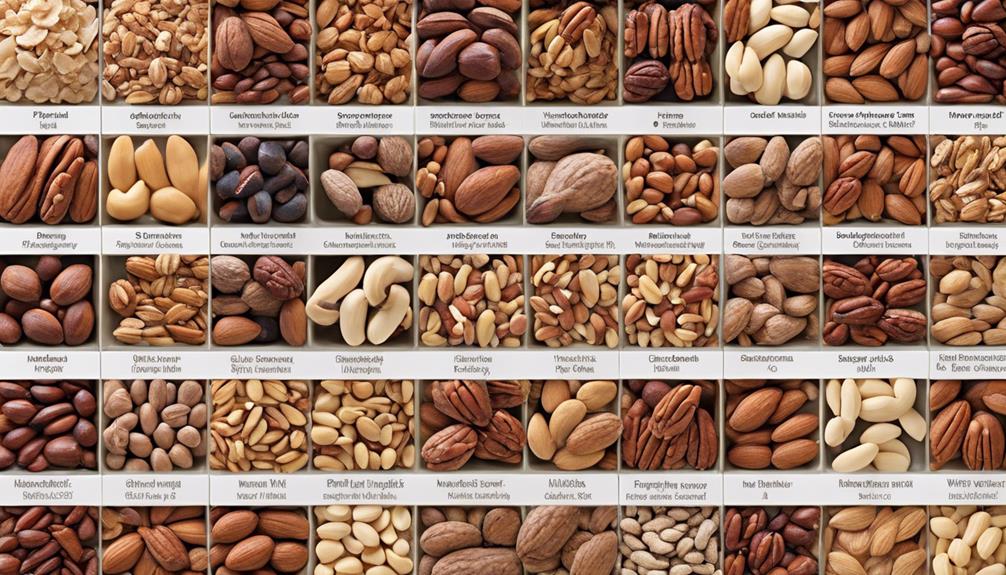When it comes to diabetes management, pecans can have a surprisingly significant impact. These unassuming nuts are filled with health benefits, particularly for those seeking to control their blood sugar levels.
But how exactly do pecans play a role in diabetes management? Let's explore the connection between pecans and diabetes to uncover the full potential of these nutrient-rich nuts.
Key Takeaways
- Pecans aid in stabilizing blood sugar levels and improving cholesterol profiles.
- Rich in fiber, healthy fats, and essential nutrients beneficial for diabetes management.
- Versatile addition to diabetic diets for crunch, nutrients, and blood sugar regulation.
- Pecans stand out among nuts for low carbs, high monounsaturated fats, and fiber content.
Health Benefits of Pecans for Diabetes
Pecans offer significant health benefits for individuals managing diabetes, including stabilizing blood sugar levels and improving cholesterol profiles. Research shows that pecans can lower bad cholesterol (LDL) and increase good cholesterol (HDL) levels, which is crucial for heart health in diabetic individuals. The low Glycemic Index (GI) of pecans helps regulate insulin levels effectively, making them a suitable snack option for those with diabetes. Moreover, incorporating pecans into the diet is associated with a 17% lower risk of cardiovascular disease in type 2 diabetes patients.
One remarkable benefit of pecans is their ability to induce a feeling of satiety, which can help prevent overeating and reduce the consumption of sugary snacks among diabetics. By promoting feelings of fullness, pecans can aid in weight management, a key aspect of diabetes care. This combination of factors makes pecans a valuable addition to the diet of individuals with diabetes looking to improve their overall health outcomes.
Nutritional Value of Pecans

Rich in fiber, essential nutrients, and healthy fats, pecans offer a well-rounded nutritional profile that supports overall health and diabetes management. A 1-ounce serving of pecans provides around 2.7 grams of fiber, aiding in digestion and promoting a feeling of fullness.
Additionally, pecans contain approximately 11.6 grams of monounsaturated fats per serving, which are heart-healthy fats known to help lower bad cholesterol levels. With only 3.9 grams of carbohydrates per serving, pecans are a suitable snack option for individuals looking to manage their blood sugar levels effectively.
These nutrient-packed nuts also offer essential minerals like magnesium and zinc, along with vitamin E, all of which play crucial roles in supporting overall health and aiding in diabetes management. Pecans have a low glycemic index, meaning they release glucose into the bloodstream slowly, helping to prevent spikes in blood sugar levels.
Incorporating Pecans Into Diabetic Diet
With their low glycemic index and high fiber content, incorporating pecans into a diabetic diet can help regulate blood sugar levels and offer a satisfying snack option. Pecans can be a versatile addition to meals, adding crunch and nutrients. Here is a simple guide on how to incorporate pecans into your diabetic diet:
| Usage | Benefits |
|---|---|
| Salad topping | Adds texture and healthy fats |
| Yogurt mix-in | Provides protein and a crunchy element |
| Snacking option | Satisfies cravings without spiking blood sugar |
| Baking ingredient | Adds flavor and nutrients |
| Nutrient boost | Rich in antioxidants and minerals |
Remember to choose unsalted, dry-roasted pecans in moderation to reap the health benefits while managing diabetes effectively. By incorporating pecans creatively into your meals, you can enjoy their taste and nutritional advantages while supporting your overall health.
Comparison: Pecans Vs. Other Nuts

Comparing the nutritional profiles of pecans to other nuts reveals distinct advantages for individuals seeking to manage their blood sugar levels effectively. Here are three key points to consider:
- Carb Content: Pecans have fewer carbs compared to cashews, almonds, and pistachios, making them a smarter choice for diabetics looking to control their blood sugar levels.
- Monounsaturated Fats: Pecans contain more monounsaturated fats than walnuts and hazelnuts, which can benefit heart health and help in managing cholesterol levels.
- Glycemic Index and Fiber: Pecans have a lower glycemic index than peanuts and macadamia nuts, which aids in preventing blood sugar spikes. Additionally, pecans are higher in fiber compared to Brazil nuts and pine nuts, promoting better digestion and blood sugar regulation.
Incorporating pecans into the diet of individuals managing diabetes can offer a range of benefits due to their healthy fats, fiber content, and overall nutrient profile, making them a top choice among nuts for blood sugar regulation.
Pecans and Diabetes Management
Pecans play a crucial role in effectively managing diabetes by offering various health benefits that contribute to stabilizing blood sugar levels and promoting overall well-being. With a low Glycemic Index (GI), pecans help stabilize blood sugar levels, making them an excellent choice for diabetic individuals. Regular consumption of pecans can also aid in lowering bad cholesterol (LDL) levels and increasing good cholesterol (HDL), which is beneficial for heart health and reducing the risk of cardiovascular disease in type 2 diabetes patients by up to 17%.
Moreover, pecans induce a feeling of satiety, which can help in controlling overeating and the consumption of sugary snacks, thus assisting in managing blood sugar levels. The anti-inflammatory properties of magnesium and vitamin E found in pecans not only promote a healthy heart but also contribute to overall well-being for individuals with diabetes. By incorporating pecans into a balanced diet, individuals can enhance their diabetes management by reaping the various health benefits that pecans offer.
Frequently Asked Questions
How Many Pecans Should a Diabetic Eat?
We should consume about 19 pecans daily for optimal health benefits. Gradually increasing pecan intake is recommended for individuals with diabetes.
Opting for plain pecans over sugary nut products is a wise choice for managing blood sugar levels effectively. Defatted pecan flour is a great option to boost polyphenol intake.
It's crucial to balance pecan consumption with a well-rounded diet and regular monitoring of blood sugar levels for overall health maintenance.
What Is the Best Nut for Diabetics?
When it comes to choosing the best nut for diabetics, almonds stand out as a top contender. They're rich in healthy fats, fiber, and protein, all of which can help regulate blood sugar levels. Almonds also contain magnesium, a mineral important for insulin function.
Adding a handful of almonds to your daily diet can be a smart choice for managing diabetes and promoting overall health.
Is It OK to Eat Pecans Every Day?
Yes, it's generally acceptable to eat pecans daily. They offer various health benefits, such as stabilizing blood sugar levels, boosting good cholesterol, and promoting satiety.
Incorporating pecans into our diet may help manage diabetes and reduce the risk of cardiovascular disease. Moderation is key, as nuts are calorie-dense.
Consulting a healthcare provider or nutritionist for personalized advice is wise. Enjoying pecans as part of a balanced diet can be a healthy choice.
How Many Pecan Nuts Should You Eat a Day?
We should consume a moderate amount of pecans daily to reap their benefits. Starting with around 19 nuts per day and gradually increasing intake is a wise approach. Research indicates that for mice, the equivalent of pecans is 22-38 nuts daily.
Opting for plain pecans is preferable over sugary nut products. Consider using defatted pecan flour for higher polyphenol content. Gradual incorporation of pecans into the diet can be beneficial for overall health.
Conclusion
In conclusion, when it comes to managing diabetes, pecans truly are the golden nuggets of nutrition.
Their low glycemic index, high fiber content, and healthy fats make them a delicious and beneficial addition to a diabetic diet.
So next time you reach for a snack, remember the power of pecans in keeping your blood sugar levels in check and your taste buds satisfied.
Let these little gems be your secret weapon against diabetes!









